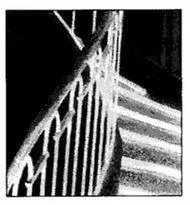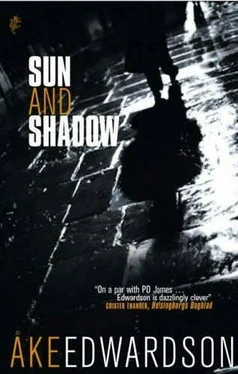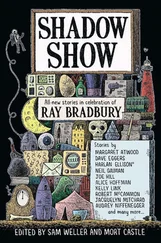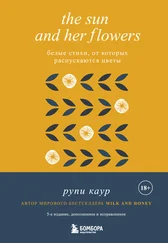“How many did you order from there?”
“Forty-one, to be precise. One in reserve.”
“Can you account for them all?”
“How do you mean?”
“Could any of them be stolen?”
‘Anything can be stolen. It’s possible to break into the costumes store. But, obviously, when we’ve finished, I’ll check that they’re all there before we send them back to Södertälje.“ He looked at the squad car. ”I’ve already done that once. This is the second round of recordings we’re into.“
“How much longer will you be doing this?”
“Until we’ve finished.” He turned to Winter. They were more or less the same height, but he was about ten years younger than Winter. “Could be another month. Maybe longer. You can ask the director.”
Winter nodded.
“So you always know where your props and costumes are?” Ringmar asked.
“Well… I won’t pretend I’m a hundred percent certain while we’re actually shooting. Not every second.”
“So somebody could take a costume home in between takes, or whatever they’re called?” Winter asked.
“Well… I suppose it’s possible.”
“Has it happened?”
“I expect so. If we’re working late and have to start early the next morning… well… it could be that not all the uniforms spend the night in the costumes store. I don’t actually know, now that you mention it.”
“All right.”
“I do know one thing, though.” He tucked the folder under his arm and rubbed his hands to warm them up. “These scenes we’re shooting… some of them… take place in the suburbs and involve immi grants, ethnic groups that are a part of the plot, I mean.”
Winter nodded.
“I don’t want any more problems than necessary… No more than all the crap that can be flying around when we’re shooting, that is. So I mean… here we have forty extras running around in police uniforms and sometimes they nearly all appear at the same time… out in Ham markullen or Biskopsgården say, and I don’t want to run any risks now, do I? Are you with me? That some bastard says something to an immigrant, or something. Makes the most of his opportunity, if you like.”
“You mean that one of the extras might turn out to be a racist?”
“Exactly.”
“And?”
“And so I’ve sent in all the… let’s call them ‘police extras’… all their ID numbers in.” He held up the file. “We’ve got all their names and addresses.”
“Sent them in? Sent them to the police, do you mean?”
“Yes. For a check, so to speak. To be on the safe side. You’ve got their details already.”
Beier had received the results of the DNA test from the lab in Link öping.
“It was Mr. Martell’s sperm.”
“Well, I’ll be damned,” Ringmar said. Whatsoever a man soweth, that shall he also reap, he thought.
“How is his wife?” Beier asked.
“In a bad way,” Winter said.
“Still more dead than alive,” Ringmar said.
“I don’t like that expression,” said Beier. “You’re either dead or you’re alive. There’s nothing in between.”
“Have you seen her?” asked Ringmar.
“No.”
Ringmar said nothing, and it was an eloquent silence.
Winter broke it.
“The Elfvegrens are coming in again tomorrow.”
Winter dialed Patrik’s home number. The boy’s father answered, as if he’d been standing next to the telephone. Winter said who he was.
He had consulted the social services: the family was notorious, but there was no history of abuse.
Winter had been thinking about Patrik. It was his duty to report a suspected case of ill treatment. It was his duty, his obligation. Nevertheless he had hesitated, spoken to the authorities. But now he had filed the report. He didn’t say anything to the man.
“I’m looking for Patrik.”
“Can’t you leave us alone?”
“Is Patrik at home?”
“You’re the second damn cop who’s phoned today and asked for him.”
“I beg your pardon?”
“The third, in fact.”
The murder investigation, Winter thought. But three cops?
“Who were they?”
“Can’t remember.”
“Did Patrik speak to them?”
“He’s not at home.”
“Can I speak to him now?”
“He’s not at home, I keep fucking telling you.”
The weather was fine again when they drove to Landvetter. There was not much traffic about as early as this in the afternoon.
“Blue skies both here and there,” his mother said. She turned to look at her son. “I’ll come back when the baby’s arrived.”
They drove around the terminal and parked in his usual place. He got a cart and they went into the departure lounge.
“There doesn’t seem to be any delay,” his mother said, then burst into tears.
He gave her a hug.
“This is the first time… the first time I’ve flown down there on my own,” she said in a faint voice. She looked up at him. “I know you want me to stay here, but I need to go. Can you understand that?”
“Yes, I understand.”
“I mean, that’s where… where your father is.”
Winter could visualize the grave, the grove, the mountain, the hill, the sea, the soil.
“He’s there and he’s also… here.”
“Of course he is, Erik.”
Let’s not go into it now, he thought, but he is here. Perhaps it’s easier this way.
She waved from the escalator up to customs and the departure gates. She was late.
He waited by the car until the plane rose like a heavy migrating bird of silver. It was sucked into the blue five thousand feet up.

*
There were fingerprints on the Zingo bottles, but far too many.
“Give me something to compare them with,” Beier had said.
“I can’t very well compare them with everybody‘s,” Winter replied.
“Half Gothenburg has held these bottles.” Beier looked at Winter, who seemed to be scrutinizing him. “Are they so important?”
Winter didn’t reply.
He drove to Häradsgatan and parked in roughly the same place as before. The wind was stronger now, and had brought clouds with it. Sleet was falling. It was afternoon again.
The clouds were scudding swiftly over the sky when he looked up at the windows of the Martells’ apartment on the sixth floor. He walked around to the entrance with its glossy tiles. A notice on a door to the right announced that a representative of the property owners would be available to tenants in this office between five-thirty and seven-thirty on the first Monday of every month. That’s this evening, he thought. They had spoken to the caretaker, but had failed to get any new information out of him.
So, somebody wearing a police uniform had passed by here in the early hours of New Year’s Day. Nobody had seen a police car. But a uniform had been seen. The witnesses all agreed: a police uniform. That had been after the murder, or murders, if Siv Martell didn’t survive. What lay in store for her if she did? Winter wondered. Not an enviable life, he supposed.
He walked back to the street and continued for a few yards as far as the crossroads. A woman was maneuvering a stroller into the Cityfast supermarket. Winter approached the shop. It looked run-down in the late winter light. There were streaks of rust in joints and around pipes, and in cracks in the paint. Winter went in. The shelves were half-empty. The only customers were Winter and the woman, who was already waiting at the checkout. At the back of the barren shop was a meat counter, the blue light around it highlighting two faded and soiled posters showing butchered cuts.
Читать дальше













